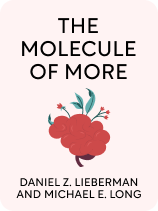

This article is an excerpt from the Shortform book guide to "The Molecule of More" by Daniel Z. Lieberman and Michael E. Long. Shortform has the world's best summaries and analyses of books you should be reading.
Like this article? Sign up for a free trial here.
What is The Molecule of More book about? How does it explain what dopamine is and how it works?
The Molecule of More by Daniel Z. Lieberman and Michael E. Long explains that dopamine motivates us to do things that we think will make us happy. Understanding how this works practically shows you the role dopamine plays in determining behavior, politics, and relationships.
Continue reading for key points from The Molecule of More book.
About The Molecule of More
Could a single molecule drive all of your ambitions, decide when you fall in love, and influence how you think? According to Daniel Z. Lieberman and Michael E. Long’s The Molecule of More book, the answer is yes; a chemical called dopamine is responsible for all of that and much more. In this book, Lieberman and Long explain the many ways that dopamine—a chemical your body naturally produces—affects your behavior, your emotions, and even your beliefs.
Lieberman is a practicing psychiatrist who specializes in treating addiction and emotional disorders like depression. He’s also the Senior Vice President of Mental Health at telehealth company Hims & Hers and a professor of psychiatry at George Washington University. In addition to his clinical and teaching work, Lieberman is a public speaker and a frequent guest on news networks such as CNN and ABC, where he discusses how neurology and biology affect human behavior.
Though trained as a physicist, Long is best known for his career as a writer and educator. He’s written everything from stand-up comedy routines—which he performed himself—to speeches for politicians, including members of the US Congress. He’s also the director of writing for Georgetown University’s graduate program in public relations.
This article starts by explaining what dopamine is and how it works. We’ll then discuss the many effects dopamine has on our thought patterns and our behavior, exploring how it affects individuals and the human race. Finally, we’ll conclude by explaining how some other chemicals in your brain work with—and against—dopamine, and why finding the right balance in your brain chemistry is the key to happiness.
Dopamine: The ‘What If’ Chemical
Lieberman and Long explain that dopamine is a neurotransmitter—a chemical for carrying signals between brain cells—that serves as both a motivator and a reward when you pursue new possibilities, or “what ifs.” Your brain releases dopamine when you encounter something new or unexpected, or when you make progress toward a personal goal. Furthermore, dopamine creates feelings of pleasure, so you’ll naturally want to pursue things that produce that dopamine high.
In short, dopamine drives you to learn new things, have unique experiences, and get what you want.
‘What If’ Versus ‘What Is’
Lieberman and Long explain that the human brain splits the world into two categories, which we’ll refer to as “what if” and “what is.”
“What if” means anything that would take effort to obtain. This category can refer to literal objects, like a bottle of milk that you need to go to the grocery store to get. However, it could also mean experiences you’d like to have or situations you’d like to be in; for example, meeting your favorite celebrity or starting a relationship with someone you’re attracted to. Dopamine motivates you to pursue things in the “what if” category.
How Dopamine Affects Behavior
Dopamine influences what you want and how much you want it, but how does it actually affect your behavior? According to the authors, it does so in many different ways, some of which are quite unexpected.
In this section, we’ll discuss dopamine’s effects on romantic interest (love), how it can influence your political beliefs, and why dopamine is the basis of creativity—as well as of some mental illnesses. We’ll also explore how dopamine affects your desires and decision-making.
How Dopamine Affects Romantic Interest
Lieberman and Long explain that the feeling of falling in love—the excitement and euphoria that sometimes seem to override logic—comes from your brain being flooded with dopamine.
This dopamine high happens because a new relationship is the basis of countless new “what if” scenarios, from fun date nights to buying a home and having children together. Since dopamine motivates you to pursue such possibilities, your brain responds to a new relationship (or even the chance of one) by producing huge amounts of it.
How Dopamine Affects Political Beliefs
Lieberman and Long say that your dopamine levels can influence your political leanings: The more dopamine you produce, the more progressive you tend to be. This makes sense when you remember that dopamine motivates you to explore new possibilities and try new things—by definition, that’s what progressives do.
How Dopamine Affects Creativity
Lieberman and Long say that dopamine drives creativity—it motivates you to think about exciting possibilities for the future and how you could turn those possibilities into reality. Strong motivation toward a particular goal causes you to make connections between things that seem unrelated and come up with innovative new ideas—in other words, to be creative.
For example, say you’re getting frustrated trying to remove stubborn adhesive residue. You might remember that citric acid can dissolve glue (as in Goo Gone). From there, you can connect the ideas of “citric acid,” “lemon juice,” and “adhesive remover,” and realize that you can use lemon juice to clean up the sticky residue.
Dopamine, Creativity, and Mental Health
Although dopamine has the positive effect of driving creativity, Lieberman and Long say that it’s possible to have too much dopamine—to be too creative and start making connections between ideas that really are unrelated. This is a common feature of mental illnesses like schizophrenia and paranoia, where someone might imagine some massive conspiracy because they’re inventing connections between unconnected events.
This happens because dopamine is responsible for what psychologists call salience, which means how relevant something seems to you, personally. When your dopamine activity is too high, things can feel relevant to you when they actually aren’t. This could be as mundane as assuming that a coworker’s bad mood is a result of something you did, or as unusual as believing that a popular song is secretly about you.
How Dopamine Affects Desires and Decisions
While dopamine is a powerful and versatile chemical, Lieberman and Long say it has two additional shortcomings.
First, dopamine doesn’t help you judge whether you should want something—in other words, whether it’s actually good for you. For example, looking at social media produces a steady stream of dopamine, but there are probably better uses of your time than scrolling through your feed for hours.
Second, dopamine makes you want things, but it doesn’t help you enjoy those things once you have them. The authors say that’s why people tend to want whatever they don’t have—they constantly strive for greater achievements, more recognition, more wealth, more possessions, and so on.
How Dopamine Balances Itself
Lieberman and Long also say that, fortunately, your brain has a system to suppress and control those dopamine-driven impulses—and it does so by using more dopamine.
This regulatory system is found in the frontal lobe (the part of your brain that handles reasoning and long-term planning). While the dopamine produced there still creates feelings of motivation, in this case, the dopamine motivates you to think things through and figure out the best way to get what you want.
How Dopamine Has Defined Human History
Lieberman and Long have explained numerous ways that dopamine affects our individual thoughts and behaviors, but just how big of an impact does it really have? According to the authors, dopamine is the reason humans are the dominant species on Earth.
To support this claim, Lieberman and Long trace the history of one particular gene variant (called DRD4-7R), which makes people who carry it even more responsive to dopamine than usual. In other words, many of the dopamine effects we’ve discussed—motivation, creativity, and interest in learning new things, to name a few—are stronger in people who have the DRD4-7R gene.
The human race originated in Africa about 200,000 years ago. Researchers have traced major human migrations since then, up until the present day when we’ve become the dominant species across the planet. When scientists compared those migration patterns to the prevalence of DRD4-7R, they found that the farther a group of people traveled from their African origins, the more common that gene is among them. According to Lieberman and Long, this suggests that heightened dopamine effects are what drove people to explore and settle new territories until humans effectively ruled the Earth.
Dopamine’s Counterparts: The ‘What Is’ Chemicals
As we’ve discussed, dopamine is the “what if” chemical because it helps you look to the future. Lieberman and Long also say there are a number of different chemicals responsible for helping you experience and enjoy the present. We’ll refer to them as the “what is” chemicals to provide a clear counterpoint to dopamine, the “what if” chemical. For example, one notable “what is” chemical is serotonin, which produces feelings of contentment and well-being (not to be confused with the dopamine-driven feelings of pleasure and excitement).
Happiness Requires Both ‘What If’ and ‘What Is’ Chemicals
Since “what if” and “what is” work against each other, which should you focus on producing? Both, according to the authors.
Lieberman and Long say that healthy, sustainable happiness involves finding the right balance of dopamine and the “what is” chemicals; you’re happiest when you’re content with the present and excited about the future. Since it’s impossible to totally focus on the present and the future at the same time, this means shifting frequently between “what is” and “what if”—for example, you might work on a task that keeps you fully engaged, then when you’re done you feel excited about having gotten closer to one of your goals.
Exercise: Think About How Dopamine Affects You
Now that you’ve read about the numerous ways dopamine influences people’s thoughts and behavior, consider how this “what if” chemical has affected your life and how you might start to balance it out by producing more “what is” chemicals.
- What’s one way that dopamine has positively influenced your life? For example, perhaps you felt motivated to reach a difficult personal fitness goal or pursue a meaningful career.
- What’s one way that dopamine has negatively influenced your life? For instance, perhaps you impulsively got into a bad relationship, or you have a habit of buying things you don’t need.
- Do you tend to focus more on “what if” or “what is?” What’s one way you could try to balance the two categories, as Lieberman and Long suggest? For example, if you tend to be “what if” oriented, you might try a hobby that demands your full attention in the moment, like martial arts. If you tend to be “what is” oriented, you could set goals that get you excited about the future: perhaps something big that you want to buy or an award that you’d like to win.

———End of Preview———
Like what you just read? Read the rest of the world's best book summary and analysis of Daniel Z. Lieberman and Michael E. Long's "The Molecule of More" at Shortform.
Here's what you'll find in our full The Molecule of More summary:
- How dopamine drives ambitions, determines love, and influences thought
- What exactly dopamine is and how it affects us
- How some chemicals, like serotonin, actively work against dopamine






